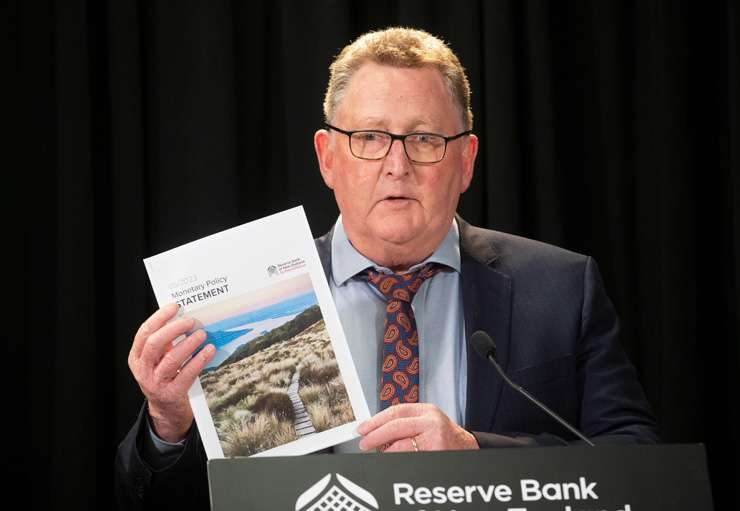More and more homeowners are struggling to sleep at night as huge mortgage increases loom, says advisers. Some are gambling on interest rates falling, but may be mistaken.
According to recent Reserve Bank of New Zealand figures, the average new residential standard floating mortgage rate was 8.45%, for one year the figure was 7.35%, two years 7.15% and three years 6.7%.
Two-year mortgage rates were averaging 2.8% in July 2021 and three-year rates taken out in July 2020, which are rolling over now as well, averaged 2.86% according to Reserve Bank figures.
Start your property search
No one can magic away 7% mortgage interest rates. However, mortgage advisers have a range of tools at their disposal to ease the pain such as: restructuring loans, splitting the mortgage over different terms, and in some cases refinancing with another bank.
Neville Modlin, a mortgage adviser at The Lending Team, says the one-year rate passing 7% was a shock to homeowners and many are having sleepless nights.
For someone with a 25-year $500,000 mortgage rising from 3% interest to 7%, mortgage repayments jumped from around $2300 to $3500 per month. “That's an extra $1200 per month,” says Modlin.
He says new clients who dealt directly with the bank when they first took their mortgage out may have the entire loan coming up for refixing at once and are now panicking. “The banks are sending them [letters] 60 days out, saying: ‘Do you want to refix at this rate?’. People are having sleepless nights. They just don’t know how they’re going to afford it.
“They might have bought in the last couple of years, and they're going from the early twos [in interest rates] to the mid- to high sixes,” says Modlin.
Around 70% of clients are refixing, but the other 30% are refinancing with different banks to get better deals. “Banks will always do their utmost to get new customers. They're offering 1% cashback and other incentives to come across. [The current lender] is just not being as aggressive for existing customers.”
Read more:
- Tony Alexander: FOMO's back - why Auckland is primed to lead the next house price surge
- Desperate homeowners turning to third-tier lenders to stave off mortgagee sales
- ‘No free rides’: Real estate’s $1 billion sales family are in it together
The best option for the average client who is on a fixed salary and who budgets, it’s a mix of two and three-year fixes, says Modlin. “To stop the panic.”
Unfortunately not everyone wants to listen to advice. Modlin has clients who are determined to put their entire mortgage on a one-year fix, believing rates will drop next year. “It’s paramount to gambling,” he says. “They are adamant rates are going to come back in the next 12 months.” Modlin tries to get them to see sense and at least split over one and two-year fixed rate periods.
Restructuring mortgages is a big part of Modlin’s business. But the one thing Modlin isn’t doing currently is recommending clients extend their mortgage term from 25 to 30 years, which lowers repayments, but is more expensive over the long term.
“When you look at the customers’ spending on Netflix, Spotify, Disney Channel, takeaways, etcetera, it hasn’t decreased. It’s very hard to justify jumping from 25 to 30 years when they haven’t made any sacrifices as yet. They’re not sleeping at night, and yet they’re not changing their lifestyle. I'd see it every single week.

The Reserve Bank of New Zealand Governor Adrian Orr in May. The RBNZ has flagged that interest rates will be higher for longer. Photo / Jed Bradley
“We are on a mission to close people's After Pay and the Gem Visas. They say: ‘it’s on sale and I can do it on After Pay’.
“They take the Gem Visa because it's 0%. But when you review the Gem Visa they’re paying upwards of 29% because they're getting into trouble. When you look at why they’re going over the limits, it’s KFC and stuff.”
Jarrod Kirkland, national manager mortgages at The Mortgage Lab, also fields calls from clients who are absolutely certain they can predict future mortgage rates. Many want to float their mortgages for now and believe that rates are on the cusp of falling.
“We get people coming in hell-bent on floating. They are bullish, and they feel the market is going to retract more quickly [than experts suggest].” Just over 10% of mortgages are on a floating rate according to Reserve Bank data. Kirkland will try to encourage his bullish clients to fix for six or 12 months if he can.
“We sit down and say: ‘what if rates don't drop’? Then you start having more rounded conversations. Invariably nine times out of 10 most people see sense.”
At the other end of the scale, he suggests to vulnerable clients that they fix on a mix of terms across two or three years to ensure they’re not hit with sudden rate rises that they can’t stomach.
There is a common perception that mortgage advisors have access to secret rates that aren’t available to the public. Kirkland says anyone can ask their bank for a better rate. He’s just better at knowing how low the bank will go than clients who don’t deal with this day in and day out.

Homeowners who bought at the peak of the market on ultra-low interest rates could be in line for a refixing shock. Photo / Fiona Goodall
Mortgage adviser Campbell Hastie, of Hastie Mortgages, says most clients typically have their mortgages split between two or three fixed rate periods. “Having essentially equal chunks on fixed terms with different fixed rates spreads things out. That’s the hedge-your-bets strategy. We’ve recommended that for as long as I can remember.”
Currently, most clients are splitting their loans in two between 18 months and two years, says Hastie.
“If we’re recommending a three-way split, you’re probably going to put a small chunk floating. Say $50,000. This gives people the ability, if they have additional cash or get performance pay, to smash that little piece out. The balance we would cut in two halves.”
One big problem in recent times has been clients trying to hold out for a special deal from the banks, just to find mortgage rates have risen, says Hastie. “People fart around waiting for 0.1% and they pay the price as [rates] have gone up again by the time they come back to it. [The message is] stop mucking around. Take it before it goes up again.”
Like the other advisers, Hastie does have to counsel some clients who think they can predict next year’s mortgage rates. “Because even the people who are paid hundreds of thousands of dollars to work out what's happening with interest rates do not know.” If at all possible he will encourage such clients to fix some of their mortgage for a longer rate than they originally ask for.
“We always ask them if they have a specific reason behind their thinking. Some people do. They’re going to sell a property or something like that. But they're in the minority. Most people come and say that because they've heard somewhere that interest rates will be lower in a year's time. But we have the conversation around whether they're going to be right about their timing.
“The term you choose should balance your desire for a lower rate and your desire for a good sleep at night.”
Explore the latest mortgage rates with our interactive. Use the search field to find out the best deals available today.


















































































